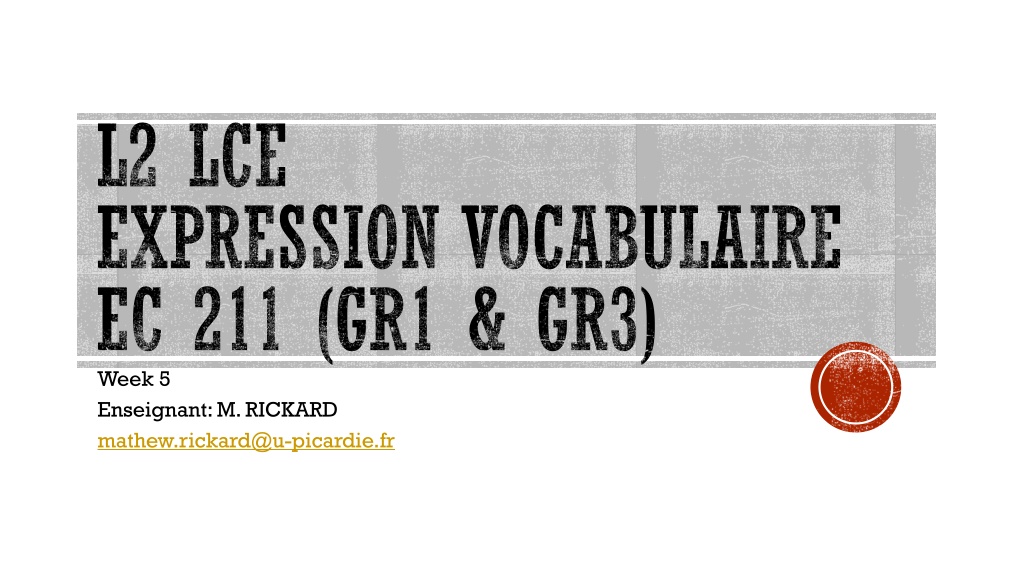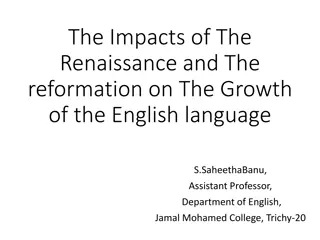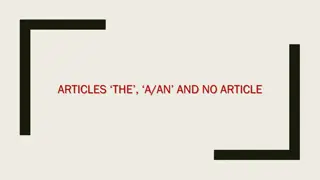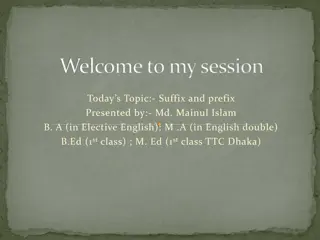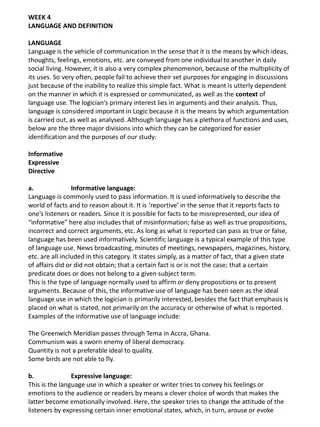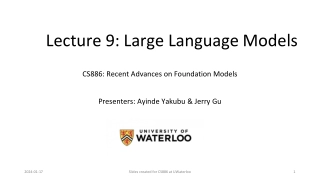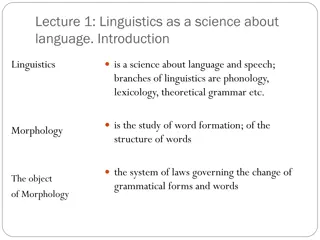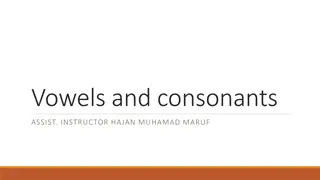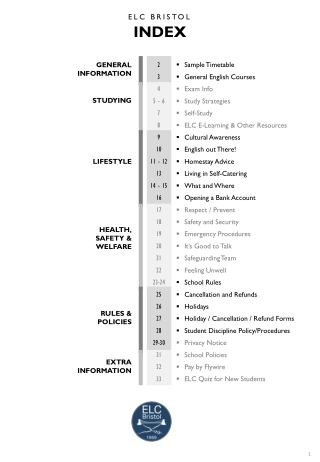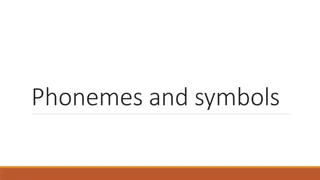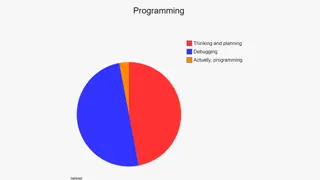Understanding Adjective Usage in English Language
Exploring the effective use of adjectives in English language, this content covers the positioning, punctuation, and order of adjectives. It explains the difference between predicative and attributive adjectives and provides examples to clarify their usage. Additionally, it discusses the importance of the Oxford comma in lists to avoid ambiguity in sentences.
Download Presentation
Please find below an Image/Link to download the presentation.
The content on the website is provided AS IS for your information and personal use only. It may not be sold, licensed, or shared on other websites without obtaining consent from the author. Download presentation by click this link. If you encounter any issues during the download, it is possible that the publisher has removed the file from their server.
Presentation Transcript
L2 LCE EXPRESSION VOCABULAIRE EC 211 (GR1 & GR3) Week 5 Enseignant: M. RICKARD mathew.rickard@u-picardie.fr
ADJECTIVES Position, punctuation, and order how to effectively use adjectives in English
ADJECTIVES: POSITION Predicative adjective (adjectif attribut): comes after the stative verb (verbe d tat) She is happy. He seems nice. Attributive adjective (adjectif pith te): next to the noun and ALWAYS before the noun in English! Un marteau rouge a red hammer ; un beau manteau bleu a beautiful blue coat
Attributive adjectives can be separated by a comma if there is a long list of them ; however, this is not obligatory : Un gadget d coratif et amusant = an amusing, decorative gadget Un homme petit et vieux = A short old man Un homme petit, vieux et chauve = A short, old, bald man The use of the comma in this instance is much more common in British English, and is linked to the use of the Oxford comma, which is considered to be much more accurate.
THE OXFORD COMMA The Oxford, or serial comma, is used to separate every single item in a list of more than three items. It is placed before and [last item]. It serves to separate each item, and ensure that there is no confusion about the meaning of the sentence: We invited the strippers, Bush and Obama to the party We invited the strippers, Bush, and Obama to the party Nous avons invit les strip-teaseurs = Bush et Obama la f te. Nous avons invit les strip-teaseurs + Bush et Obama la f te.
In some instances, we do have to place the adjective after the noun: If the noun is replaced by a pronoun composed of some any no : Could you say something nice for a change. If the relative clause is understood between the noun and the adjective; this is the case in particular for adjectives ending in able/ible such as available conceivable possible responsible suitable : All the people (who were) available were asked to help.
ADJECTIVES: WHEN TO USE AND Between the penultimate and last predicative adjective: He is kind and generous. He is kind, generous, and approachable. Between two attributive adjectives when they are linked: A social and educational problem ; a British and French initiative BUT a French classical pianist
Between two attributive adjectives when they are used to separate different groups which are being talked about together: Business people from large and small companies = there are both large and small companies European and American traditions = some traditions are European, some traditions are American
ADJECTIVES: TALKING ABOUT COLOUR We use and when we are talking about multiple colours: Un film en noir et blanc a black and white film Un drapeau bleu, blanc, et rouge and blue, white, and red flag If we don t use and , this will create a compound colour: Une robe bleu-vert a blue-green dress Une robe bleue et verte a blue and green dress (some parts are blue, some parts are green)
ORDER OF ATTRIBUTIVE ADJECTIVES The order of adjectives goes from the most subjective to the most objective: Judgment Brilliant Size Big Age Old Young Colour Blue Green Origin American Wooden A fantastic new red train = un nouveau train rouge superbe Extraordinary Small In French, remember the formula (in French) of TACOM: [taille, ge, couleur, origine, mati re] As before, if there are more than two adjectives, these will be separated by a comma With the adverb too, the order is the following: too + adjective + a + noun He is too honest a boy to be lying
SOME PARTICULAR ADJECTIVES Adjectives which end in ED have a passive meaning; adjectives which end in ING have an active meaning: Astonished surpris ; Astonishing surprenant Interested int ress ; Interesting int ressant
De longs rideaux rouges Long red curtains Une d licieuse eau min rale italienne A delicious Italian mineral water Le logement individuel et collectif est concern par la r forme. (Both) individual and collective housing is concerned by the reform. Des d corations rouge et or (pas d accord en fran ais quand l objet est compos de plusieurs couleurs = d corations de couleur rouge et or) Red and gold decorations Des d corations rouge vif (pas d accord en fran ais avec les couleurs compos es ou qualifi es par un adjectif = d corations d un rouge vif) Bright red decorations Une couverture bleu-nuit (pas d accord en fran ais avec les couleurs compos es ou qualifi es par un adjectif) A midnight-blue blanket Des drapeaux bleu, blanc, rouge (= chaque drapeau a les 3 couleurs) Blue, white, and red flags Des drapeaux bleus, blancs, rouges (= il y en a de chaque couleur) Flags that were blue, white, or red / ( ventuellement) blue and white and red flags
SYNTAX Problems: word order in sentences; punctuation
WORD ORDER IN A SENTENCE The direct object is never separated from the verb: Either by an adverb: Sue aime beaucoup le chocolat Sue likes chocolate a lot. Sue n'aime pas beaucoup le chocolat. Sue does not like chocolate very much. An adverbial phrase: Nous avons rencontr en Chine des gens absolument charmants. We met some really delightful people in China.
Or by an indirect object: Le guide a d crit aux touristes le plafond de la Chapelle Royale. The guide described the ceiling of the King s Chapel to the tourists. _____________________________________________________________________________ An adverbial phrase will come either at the beginning or the end of the sentence: J'ai achet en 1990 un stylo qui n'a pas besoin de se recharger. ln 1990 I bought a pen that doesn't have to be refilled. When you are using an adverbial phrase to describe both time AND place, the place will come before the time: J'ai achet ce stylo le mois dernier Oxford. I bought this pen in Oxford last month.
SYNTAX/WORD ORDER EXERCISE : PUT THESE SENTENCES IN ORDER, KEEPING THE SUBJECT AS THE BEGINNING OF THE SENTECE) Elmer / listens / to old records / often Vanessa / documentary films / very much / likes Elmer / plays / never / the piano Vanessa / an excellent film / saw / last night Elmer / has / in his flat / a collection of several hundred records Vanessa / sometimes / describes / to Elmer / the films she has seen There are / in Vanessa's room / two TV sets and a DVD player Vanessa / has explained / to Elmer / her passion for ancient Egypt Elmer / second-hand records / often / buys 10. Elmer / much / contemporary music / like / doesn't 1. 2. 3. 4. 5. 6. 7. 8. 9.
PUNCTUATION: APPOSITION (ADDING INFORMATION) When a nominal group immediately follows another in the sentence to provide additional information, it is said to be in apposition. This second nominal group must be enclosed in commas (one before AND one after): Marie Curie, a famous chemist and physicist, won the Nobel prize in 1903. The noun phrase in apposition must be preceded by an article (a/an/the), except when it is a function that can only be occupied by a person (the definite article is then optional): John Harris, a teacher, criticized the government's reform in front of the press yesterday Alf Stiegler, (the) president of General Motors, was very famous.
You can have something other than a nominal group in apposition, but there will always be two commas, one before and one after. Past or present participle The Hulk, also called the jade giant, is a green superhero. The children, thinking that it was very late, were hurrying. Relative subordinate clause Mary's car, which was parked in the street, was stolen yesterday. (simple addition of information - "that" impossible) The car that was parked in the street was stolen yesterday. (no comma, because the relative is needed to identify the car - "which" possible in writing, but unlikely in speaking)
You can have something other than a nominal group in apposition, but there will always be two commas, one before and one after.: Adjective (only when there is a complement to the adjective) Rather tired, the children sat on the grass / The children, rather tired, sat... BUT The children, who were tired, sat on the grass (NOT the children, tired,...) This decision, unfair to the bus drivers, will certainly be attacked. BUT This decision, which is unfair, will certainly be attacked. (NOT the decision, unfair,...) NB : en fran ais, on peut avoir un adjectif seul en apposition : Les enfants, fatigu s, s assirent sur l herbe. La d cision, injuste, sera certainement combattue.
APPOSITION EXERCISES FORM ONE SENTENCE FROM ALL THE INFORMATION GIVEN My mother lost her favorite ring. It was a gift from her great grandmother. The Han River flows through Seoul. It is South Korea s second longest river. The first man in space was from Russia. He was Yuri Gagarin. I sat beside Mr. Jones. He is a city policeman. Jack s dog sat beside a tree and panted. His dog is a big black mutt. Jenny loves to bake bread, cake and cookies. She is a prize-winning baker. I just purchased a house near Central Park. The house is a 30-year old duplex. Polar bears are large and furry animals. They eat seals but not penguins. My grandfather s dog is a black poodle. It is cute. The dog loves to run and catch rubber balls. 10. I watched a movie on the weekend. It was Frozen. It is my favorite movie 1. 2. 3. 4. 5. 6. 7. 8. 9.
My mother lost her favorite ring. It was a gift from her great grandmother. My mother lost her favorite ring, a gift from her great grandmother. The Han River flows through Seoul. It is South Korea s second longest river. The Han, South Korea s second longest river, flows through Seoul. The first man in space was from Russia. He was Yuri Gagarin. The first man in space, Yuri Gagarin, was from Russia. I sat beside Mr. Jones. He is a city policeman. I sat beside Mr. Jones, a city policeman. Jack s dog sat beside a tree and panted. His dog is a big black mutt. Jack s dog, a big black mutt, sat beside a tree and panted. Jenny loves to bake bread, cake and cookies. She is a prize-winning baker. Jenny, a prize-winning baker, loves to bake bread, cake and cookies. I just purchased a house near Central Park. The house is a 30-year old duplex. I just purchased a house, a 30-year old duplex, near Central Park. Polar bears are large and furry animals. They eat seals but not penguins. Polar bears, large and furry animals, eat seals but not penguins. My grandfather s dog is a black poodle. It is cute. The dog loves to run and catch rubber balls. My grandfather s dog, a cute, black poodle, loves to run and catch rubber balls. I watched a movie on the weekend. It was Frozen. It is my favorite movie. I watched my favourite movie on the weekend, Frozen.
